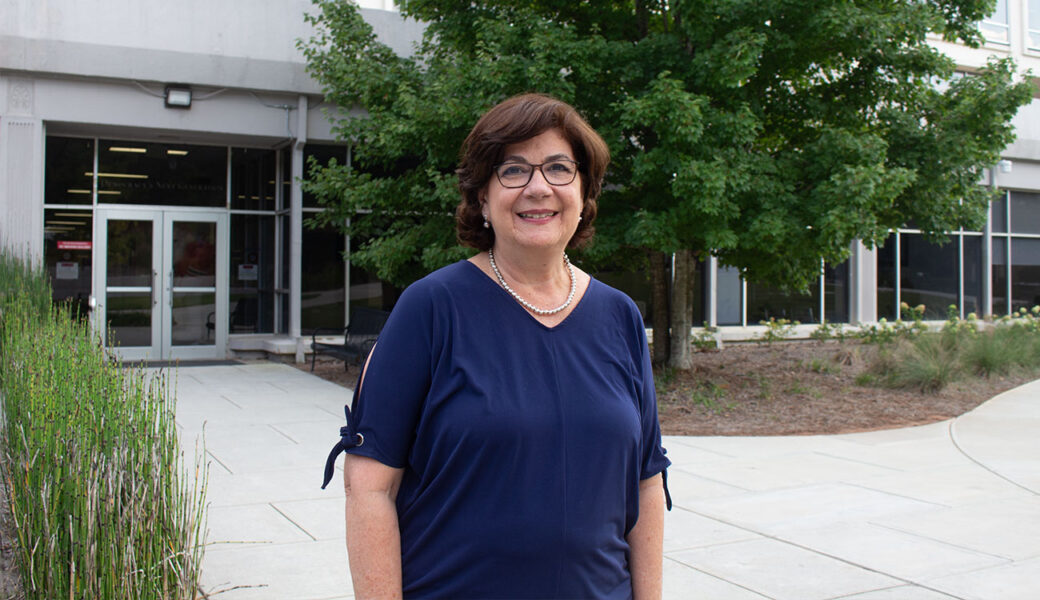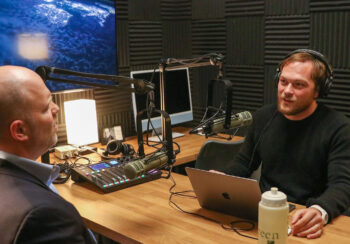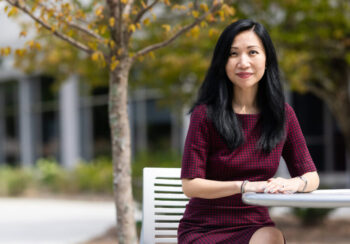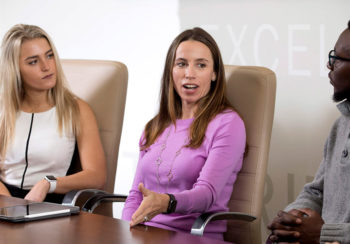Carolina Acosta-Alzuru never would have guessed her career trajectory when she graduated from Georgia Tech with a degree in computer science in 1982. A career she thought would be marked by years in information technology has instead led her to the University of Georgia, where she earned her master’s and doctorate and is now a Josiah Meigs Distinguished Teaching Professor in the Grady College of Journalism and Mass Communication’s Department of Advertising and Public Relations. It’s an interesting and unique story, filled with “aha!” moments, changes of course and a heaping helping of televised media. She spoke with Research Communications to discuss her journey.
How did your career shift from computer science to media communications?
After I got my bachelor’s degree at Georgia Tech, we returned to our home in Venezuela. I was in my 20s and was the head of a small department that handled computing for a group of privately owned companies. In my fifth year back, I was called by a university in Venezuela to teach information and computer science to mass communications students. I grudgingly accepted the job, and that changed my life.
Grudgingly?
I allowed my dad to convince me to say yes. I originally turned them down. But he said, “What do you mean you said no?” I was like, “Why would I say yes? I’ve never done it before. I’m not a teacher. I don’t know how to do it.” But he told me that in our country, somebody like me, who has a degree from abroad, who speaks two languages, couldn’t say no to education. I was so worried that I’d be horrible, but in the first half-hour, I thought, “This is what I want to do.” I loved it.
Before long, I was hearing a lot about what the students were learning, and I started to realize I was more interested in some of those things. I was enamored with the idea of decisions in media: Who decides who they interview for this story? What does that do to the people who are reading? What if they had chosen someone different? Why don’t they talk about this or that? That led to other interests: newspapers and magazines like Time and Newsweek in the U.S., and what they were saying about Venezuela. They weren’t really saying much, so what does that do to people?
At some point, [former Venezeulan President] Hugo Chavez arrived in our lives. My husband and I started worrying. We didn’t like that many people were fascinated with him. We were not. We said, “Why don’t we just go to the U.S. for a couple of years?” I could get my master’s in communication to teach. The kids could learn their English, and we could expose them to more diversity. Once we came, I had another realization: I love academic research. Meanwhile, Venezuela was sliding into revolution, so we stayed.
You do research at the intersection of media, culture and society. What does that mean in the context of your own work?
It means unravelling the braid that exists between them. It means not examining any of them in isolation. For example, I did my dissertation on the American Girl dolls and what version of girlhood they were portraying. Shortly after finishing my doctoral degree, though, someone told me about a Venezuelan telenovela they were beginning to broadcast in the U.S., and I thought that was interesting. It was called “El país de las mujeres” (“The Country of Women”) and had many feminist overtones. It was about Venezuelan culture and women, but it was like the ocean: Once I started to walk into it, it just got deeper and deeper.
What got me was an important paradox. The characters were contesting the traditional femininity that is often oppressive to women, but at the same time were speaking badly about the term “feminism.” For instance, there was a woman who suffered domestic violence. She went to the police and told them what happened and divorced her husband, which was a very brave thing at the time. But that same character would deride feminism in other aspects of her interactions. So there were these divergent aspects of womanhood in the telenovela, and I thought that was so interesting. But telenovelas, and their links to the cultures and societies that produce and consume them, are also like an ocean, and a changing one. Therefore, I’m still walking into it.
El Pais de Las Mujeres is a Venezuelan telenovela produced by Venevisión, one of two primary networks in the country. Acosta-Alzuru has used this telenovela, as well as others, as a subject in media and culture research throughout her academic career.
Your recent work involves Turkish dramas. How are they related to the telenovelas?
Latin American telenovelas are very popular around the world. But about six years ago, I noticed that the broadcasters in countries of Eastern Europe were no longer programming them. In their place were Turkish titles. Well, there was a theoretical explanation for that: cultural proximity. Then I lived in Chile for two months while on the Fulbright Program and found that Chile’s primetime also had Turkish dramas. I started looking, and the Turkish series were also in Uruguay, Argentina, Peru. There was something going on, and it turned out that Turkey had become No. 2 globally—behind the U.S.—in dramatic content produced.
I did a study and learned just how massive the industry was in Turkey. There were about eight networks and 20 major production companies to go along with the number of actors and directors. And they had displaced telenovelas in many places with their effective storytelling. Telenovelas had become predictable, but Turkish dramas defied expectations. They were also extremely well produced, and their settings—for example, Istanbul—were new to viewers around the world.
You mentioned the impact of Chavez on your career, and now you mention Turkey, where Recep Tayyip Erdogan is president. I’m interested because both are considered populist and autocratic leaders. When you research through the lens of populism in Venezuela, Turkey or even here in the U.S., what role does media play?
You cannot avoid connecting Venezuela and Turkey. Everything I saw in Turkey, I had already seen in Venezuela. You learn how a government that becomes increasingly autocratic begins pushing just one version of reality—its version. It does that in several ways. Turkey, for example, is one of the countries that has the most journalists imprisoned in the world. That’s one way, a very harsh, anti-human rights way. Another is to say the media are bad or fake, or that they are your enemy, and no one should believe anything they say. That’s supposedly milder than putting people in jail, but it can be just as corrosive. Or a third way is to close television stations, newspapers and radio stations.
In Venezuela, Chavez closed one of the two major television networks, which was one of the two major telenovela producers. That’s half the telenovela industry. The surviving network then went into self-censorship mode. It would tell writers, “You can’t say this.” There wasn’t a law that these writers were breaking, but the network didn’t want to risk anything. So the Venezuelan telenovela industry was eventually asphyxiated by the government. In Turkey, Erdogan faces the paradox of controlling television, but also understanding how well their dramas sell abroad and bring tourism [to Turkey]. It’s a form of soft power that the government wants—but also wants to keep in check.
There’s a changing role of media in society given rapid advances in technology. How have you seen that manifest in your work?
When I began my research and people asked what I did, I would tell them I studied television. By then, already, I would ask myself what “watching television” really meant. There were already VHS tapes and then TiVo. Now, imagine that question today. We have streaming platforms, web content, short-form media and more. And now we are all producers. The line between producing and consuming is blurred. Everything is changing quickly, including production models and business models, and it’s hard to predict the future. Everyone who is a player in the content industry is placing bets right now, but no one really knows exactly where we’re headed.






